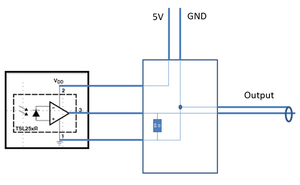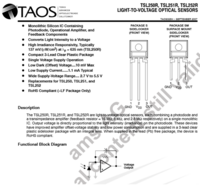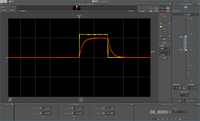Screen Trigger Device specifications
Description
The screen trigger device is a small optical sensor that can be mounted in the corner of a screen. It contains a photo diode with build in amplifier that senses the intensity of the screen locally. It has a BNC output that gives 0 Volt output when the screen is locally black and 5 V output when the screen is locally white. This can be used to create a digital timing signal for changes on the screen.
Design


The screen trigger devices has a TSL25xR photo sensor with build-in amplifier. The output current of the TSL25xR is led over a resistor in order to create a output voltage between 0 and 5V. Five devices of this simple version has been build.
Two devices has been build with an extra op-amp (LM358) and a 200kOhm adjustable voltage divider. With this device the light sensitivity can be adjusted. These devices need a 9V power supply.
Components
- Box: Hammond 1551 Series Black ABS Enclosure, IP54, Flanged, 50 x 35 x 20mm
- Power supply: 5V, 2.5A, 2-Pin Type C - EuroPlug with 2.1mm DC connector
- Socket: Cliff Electronic Components DC10A SOCKET, PCB, DC POWER, 2.1MM, PK10
- Photo Diode: Taos TSL25xR
- Resistor: 10 kOhm
Specsheet photo diode
Speed test Screen Trigger Device
A led was connected to the output of the function generator. The led was used to illuminate the photo diode.
- The function generator signal is shown in yellow.
- The output of the screen trigger detector is shown in red.
- Risetime and falltime of the screen trigger detector is about 0.2 mSec

